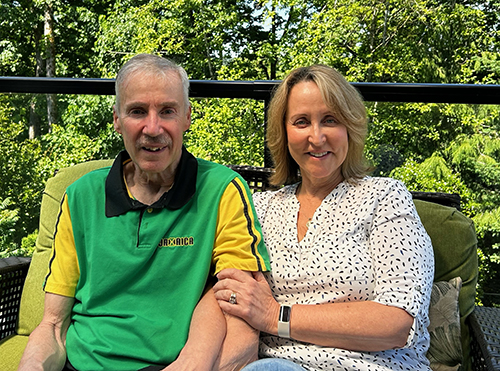Arlene Thygesen wishes people knew that Parkinson’s disease (PD) isn’t just tremors, and that it doesn’t only happen to older people. She has seen firsthand the myriad of effects of the illness on her husband, Peter, who was diagnosed in May 2018 following a trip to Mexico during which he experienced mobility issues. “We were not surprised by the diagnosis, actually, as I had suggested after years of not having a diagnosis that he tell his general practitioner we think it is Parkinson’s,” Arlene says. “However, friends and family were shocked when we finally shared the news. They thought Peter was too young for an ‘old person’s’ disease. I don’t think our loved ones realized all the non-motor effects of PD.”
Due to Peter’s symptoms, the couple has had to make lifestyle adjustments. They can no longer take part in one of their most cherished activities, traveling, which they used to enjoy together every April in celebration of their anniversary. Arlene says that they have less time together in general now, as she often must run errands by herself. However, she says she frequently watches the clock, since Peter cannot be left alone for extended periods. Compounding the situation, Peter gave up driving when he recognized it was no longer safe for him to do so. This decision has had a substantial effect on Arlene, who now bears the responsibility of making sure that he can attend various outings and appointments.
Despite the challenges they face, maintaining a strict routine has proven invaluable for both Arlene and Peter. “We have to make sure he takes his meds in the correct dosage and at the right time,” she says. “We learned this the hard way after some very frightening ‘off’ periods that landed him in the hospital.” Exercise in their home gym has also been a big help in keeping Peter engaged and active. He takes great pleasure in boxing, having been involved in Rock Steady Boxing prior to the pandemic.
In the afternoons, Arlene and Peter carve out precious moments to savour a latte while watching their favourite soap opera. Arlene reflects, “This is a ritual we have had for many years, and we continue every day.” She acknowledges that although an individual with Parkinson’s may be unable to express themselves the way they used to, the essence of the person they were remains the same. Sharing an afternoon latte has become a means of preserving their bond in the face of these difficult changes. “It doesn’t sound like much, but it is something we can do together,” Arlene says.
As a carepartner, Arlene continues to adapt to every hurdle Parkinson’s throws at them and, as a result, emphasizes the importance of prioritizing self-care. “It is a cliche, but so very true, that we carepartners have to look after our own health too and ‘put our oxygen masks on first.’” Arlene also has learned that she cannot do it all on her own and must depend on others to help her.
Arlene suggests that individuals newly diagnosed with Parkinson’s seek out others who are navigating a similar journey. As she adapted to her role as a carepartner, she became a co-facilitator for the local support group in her community. “Others walking the same path will share generous nuggets of information,” Arlene says. “Anything you are experiencing has likely been experienced by others.”

